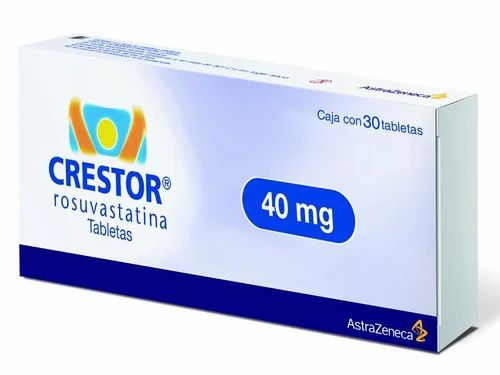Crestor: Health Benefits & Risks
What are the health benefits of Crestor?
Crestor (rosuvastatin) is a medication used to lower cholesterol levels in the blood. It belongs to a class of medications called statins, which work by reducing the production of cholesterol in the liver. Some of the health benefits of Crestor include:
- Lowering LDL cholesterol: Crestor is effective in lowering levels of low-density lipoprotein (LDL) cholesterol, often referred to as “bad” cholesterol. High levels of LDL cholesterol are a risk factor for heart disease and stroke.
- Increasing HDL cholesterol: Crestor can also increase levels of high-density lipoprotein (HDL) cholesterol, often referred to as “good” cholesterol. HDL cholesterol helps remove LDL cholesterol from the bloodstream, reducing the risk of plaque buildup in the arteries.
- Lowering triglycerides: Crestor can lower levels of triglycerides, another type of fat found in the blood. High triglyceride levels are also a risk factor for heart disease.
- Reducing the risk of heart attack and stroke: By lowering LDL cholesterol and triglyceride levels, Crestor can help reduce the risk of heart attack, stroke, and other cardiovascular events in people at high risk.
- Slowing the progression of atherosclerosis: Crestor has been shown to slow the progression of atherosclerosis, the buildup of plaque in the arteries, which can help prevent heart disease and stroke.
- Improving overall cardiovascular health: By improving cholesterol levels and reducing the risk of heart disease and stroke, Crestor can help improve overall cardiovascular health and reduce the risk of related complications.
It’s important to note that Crestor should only be used under the supervision of a healthcare provider and as part of a comprehensive treatment plan that may include lifestyle changes such as diet and exercise. Crestor may not be suitable for everyone, and it can cause side effects and interactions with other medications. It’s important to discuss the potential benefits and risks of Crestor with your healthcare provider before starting treatment.
What are the health risks of Crestor?
Crestor (rosuvastatin) is generally well-tolerated, but like all medications, it can cause side effects and carry certain health risks. It’s important to be aware of these risks and discuss them with your healthcare provider before starting treatment. Some of the health risks associated with Crestor include:
- Muscle pain and weakness: Statins, including Crestor, can cause muscle pain, tenderness, or weakness, a condition known as myopathy. In rare cases, myopathy can progress to a more serious condition called rhabdomyolysis, which can lead to kidney damage or failure.
- Liver damage: Crestor can cause liver damage, although this is rare. Liver function should be monitored regularly with blood tests.
- Increased blood sugar levels: Some people taking Crestor may experience an increase in blood sugar levels, which could lead to the development of type 2 diabetes. Monitoring blood sugar levels is recommended, especially in individuals with risk factors for diabetes.
- Neurological side effects: Some people taking Crestor may experience neurological side effects, such as memory loss, confusion, or forgetfulness. These side effects are usually mild and reversible once the medication is stopped.
- Digestive issues: Crestor can cause digestive issues, such as nausea, diarrhea, constipation, and abdominal pain.
- Allergic reactions: Some people may be allergic to Crestor and may experience symptoms such as rash, itching, swelling, dizziness, or difficulty breathing. If you experience any of these symptoms, seek medical attention immediately.
- Interactions with other medications: Crestor can interact with other medications, including certain antibiotics, antifungal medications, and HIV medications, increasing the risk of side effects.
It’s important to use Crestor only as prescribed by a healthcare provider and to follow their instructions carefully. If you have any questions or concerns about Crestor, talk to your healthcare provider.
TL; DR: Crestor Summary
Crestor is a brand name for the prescription medication rosuvastatin, which is a type of statin medication used to lower cholesterol levels in the blood. It belongs to a class of drugs known as HMG-CoA reductase inhibitors, which work by blocking the enzyme in the liver that produces cholesterol.
Crestor is commonly prescribed to lower LDL (bad) cholesterol and triglycerides, and to raise HDL (good) cholesterol in individuals with high cholesterol levels. It is also used to reduce the risk of heart attack, stroke, and other cardiovascular events in people with existing heart disease or other risk factors.
The dosage of Crestor will vary depending on the individual’s cholesterol levels, medical history, and response to treatment. It is typically taken orally once daily, with or without food. It is important to take Crestor regularly to get the most benefit from it.
Common side effects of Crestor may include headache, muscle aches or weakness, stomach pain, constipation, and nausea. More serious side effects may include liver problems, muscle breakdown, and an increased risk of diabetes.
Crestor can interact with other medications and supplements, so it is important to inform your healthcare provider about any existing medical conditions or medications you are taking before starting treatment with Crestor.
It is important to have regular blood tests to monitor your cholesterol levels and liver function while taking Crestor. Your healthcare provider may also recommend lifestyle changes such as a healthy diet, regular exercise, and smoking cessation to further improve your cholesterol levels and reduce your risk of heart disease.
If you have any questions or concerns about taking Crestor, be sure to discuss them with your healthcare provider. It is important to seek medical attention if you experience any severe or persistent side effects while taking Crestor.




